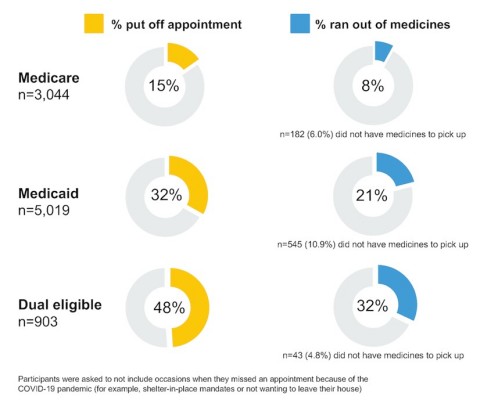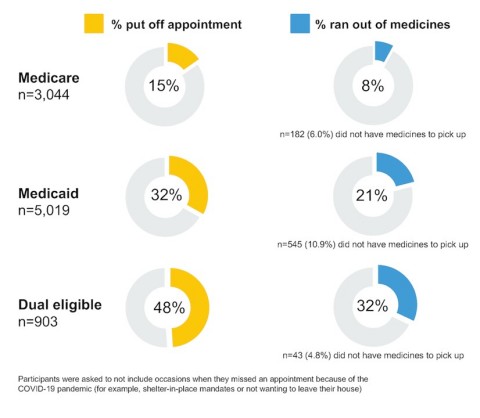SAN MATEO, Calif.--(BUSINESS WIRE)--Continuing its commitment to healthcare equity, Evidation today announced the results of a national survey conducted in partnership with Lyft Healthcare to better understand transportation needs and insecurity among Medicare and Medicaid beneficiaries. The results suggest that transportation insecurity may magnify health disparities, and that healthcare inaccessibility for vulnerable populations remains a significant challenge across the United States.
The research, conducted during November and December 2020, included nearly 9,000 participants from across the country. Thirty-one percent of beneficiaries surveyed missed provider appointments or ran out of medicine because they could not access transportation. These individuals were more likely to suffer from chronic conditions and mental illness, come from low-income households, and be under the age of 65.
The survey also revealed other key characteristics and challenges of transportation insecure populations, which were defined as beneficiaries with problems getting to healthcare services or picking up prescription medicines. The findings include:
- Transportation insecurity was most common among Medicaid and dual eligible beneficiaries (those qualifying for both Medicare and Medicaid benefits).
- Of those surveyed, Medicaid beneficiaries are the most impacted by transportation insecurity. Medicaid and dual eligible beneficiaries miss appointments at double and triple the rates of Medicare beneficiaries and run out of medicine at triple and quadruple the rates of Medicare beneficiaries.
- Almost half of transportation insecure individuals surveyed are late to or needed to reschedule more than 10% of their healthcare appointments. It takes longer for transportation insecure individuals surveyed to get to their appointments, regardless of mode of transportation.
- Transportation barriers reported include an inability to pay for gas (31%), not having a driver’s license (27%), being unable to take public transit (24%), and not having a working vehicle (23%).
- Non-emergency medical transportation (NEMT) benefits, a potential solution for transportation insecurity among Medicare and Medicaid beneficiaries, appear to be underutilized. Only 29% of Medicaid beneficiaries, for whom NEMT is a required benefit, were aware of their NEMT benefit. Of those who are aware, only 37% have used NEMT for themselves or a dependent.
- Compared to other subgroups, rideshare service for NEMT was the most popular among transportation insecure individuals.
"Improving health outcomes is central to Evidation's mission, and these results reaffirm that the absence of reliable transportation inhibits access to basic healthcare and medicines, particularly among already vulnerable Americans,” said Andrea Varsavsky, Head of Research and Analytics at Evidation. “At a time when getting to a medical appointment is more important than ever before, we need to work together to leverage existing programs to improve healthcare accessibility and expand affordable and convenient options for all.”
“We know that lack of transportation is a key reason why people miss or delay the vital care they need,” said Megan Callahan, Vice President of Lyft Healthcare. “At Lyft, we want to take that understanding to the next level, particularly as the COVID-19 pandemic has exacerbated this problem and tens of millions of Americans will face transportation challenges getting to and from vaccination sites. This work is core to our mission, and it’s more important than ever.”
The study was conducted using Evidation’s platform and network, Achievement, which includes a connected cohort of over 4 million individuals, representing 50 states and nine out of every 10 ZIP codes nationwide.
The largest and most demographically and geographically diverse health focused connected cohort in the U.S., Achievement prioritizes user privacy and control, and a per program consent based model for data sharing. Achievement members have contributed to pioneering studies on COVID-19, Alzheimer’s disease, chronic pain, and others. To join Achievement and participate in cutting-edge research and health programs, visit myachievement.com.
About Evidation
Evidation measures health in everyday life and enables anyone to participate in groundbreaking research and health programs. Built upon a foundation of user privacy and control over permissioned health data, Evidation's Achievement platform is trusted by millions of individuals—generating data with unprecedented speed, scale, and rigor. We partner with leading healthcare companies to understand health and disease outside the clinic walls. Guided by our mission to enable and empower everyone to participate in better health outcomes, Evidation is working to bring people individualized, proactive, and accessible healthcare—faster. Founded in 2012, Evidation Health is headquartered in California with additional offices around the globe. To learn more, visit evidation.com, or follow us on Twitter @evidation.
About Lyft Healthcare
Lyft Healthcare is one of the largest providers of non-emergency medical transportation (NEMT) services across the United States, supporting access to reliable rides for millions of eligible patients who lack transportation. Thousands of healthcare organizations partner with Lyft Healthcare — including nine of the top 10 NEMT managers, nine of the top 10 health systems, the top 10 health plans, large retail pharmacy chains, and key healthcare IT organizations like Epic and Allscripts — to reduce costs, improve the patient experience, and expand access to care. Additionally, Lyft is eligible to provide access to transportation for up to 37 million eligible Medicaid beneficiaries across 14 states and the District of Columbia.




